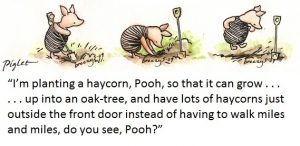In the stories of Winnie the Pooh, acorns feature occasionally. Tiggers don’t like to eat them, but Piglets do, although they call them ‘haycorns’. Eggcorns are similar in origin – deriving from a woman who substituted ‘eggcorn’ for acorn.
The word has been adopted into the language to mean ‘an idiosyncratic substitution of a word or phrase for a word or words that sound similar or identical in the speaker’s dialect.’ Wikipedia goes on to explain, ‘The new phrase introduces a meaning that is different from the original but plausible in the same context, such as “old-timers’ disease” for “Alzheimer’s disease”.’
Eggcorns often crop up in the vocabulary of someone who has heard a phrase, and not quite caught it right, or been unaware of the spelling, for example ‘preying mantis’ instead of ‘praying mantis’. You can see where the confusion occurs, as they are certainly preying creatures.
I recently came across a brilliant poem full of eggcorns, by Brian Bilston, which is hilarious.
On Tender Hooks
I’m on tender hooks.
You charge at the English Language
like a bowl in a china shop.
Please nip it in the butt.
On the spurt of the moment,
the words tumble out.
It’s time you gave up the goat.
Curve your enthusiasm.
Don’t give them free range,
the chickens will come home to roast.
And now you are in high dungeon.
You think me a damp squid:
on your phrases I should not impose.
But they spread like wildflowers
in a doggy-dog world,
and your spear of influence grows.
Brian Bilston
It’s one of those things that the more you know, the funnier it is. Like the Toy Story films, which have things in which are only funny to grownups, and the Asterix books, which have jokes that only make sense if you have picked up some Latin along the way.
When the author posted this poem on Twitter, the replies included some positively painful manglings of English words and phrases, including referring to someone as ‘a pillow of society’, having ‘very close veins’ in one’s legs, ‘passing mustard’ instead of passing muster, looking for ‘escape goats’, and ‘setting a president’.
Interestingly, neither spellcheck nor grammar check registers any of these as errors, so they roam the world at large with their authors unaware of the hilarity they’re causing. Even in published books and newspapers I have seen mix-ups involving peaked instead of piqued, and once someone having a ‘naval piercing’. Sounds painful!
This is a small aside, really, just venturing into the territory of ‘what shouldn’t be done to the English language’. I hope you enjoy the eggcorns as much as I do!




Leave a Reply